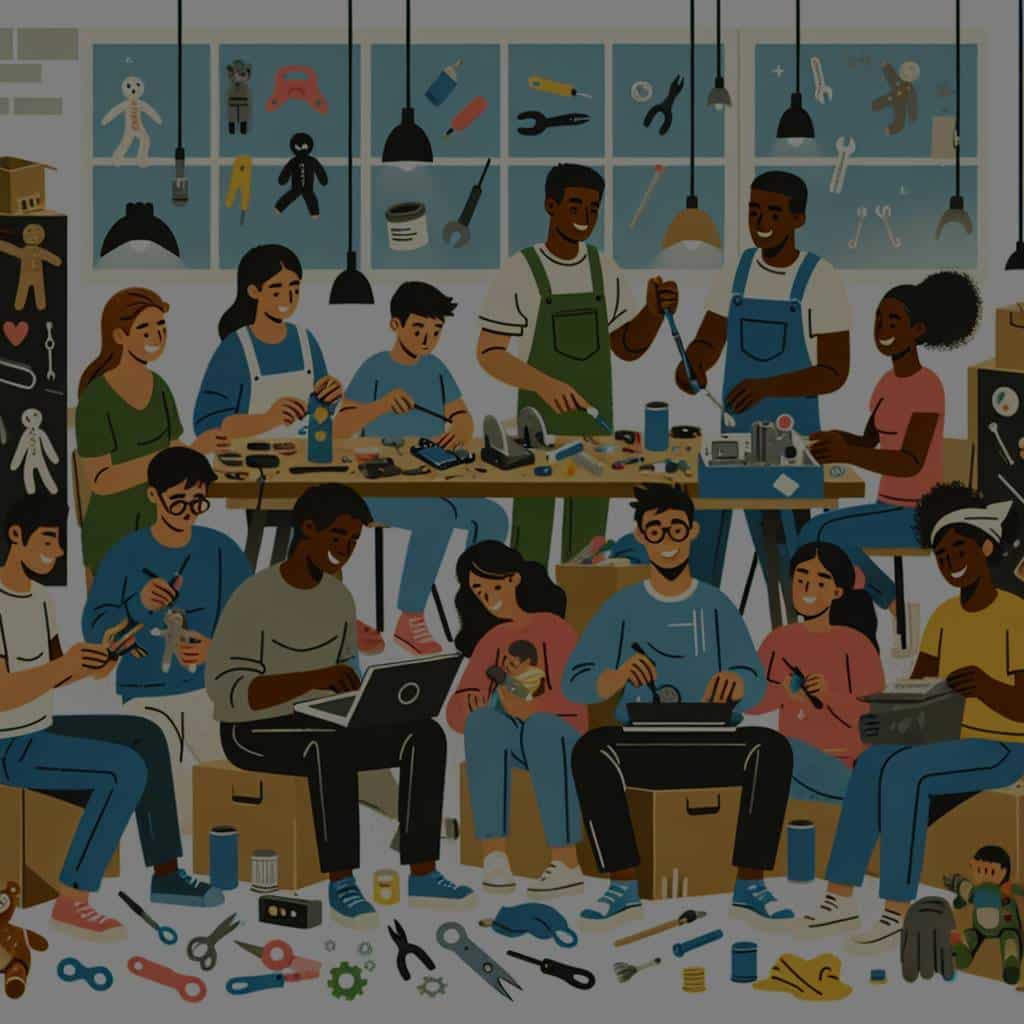Can Community-Run Repair Cafés Reduce Stress and Boost Self-Efficacy by Teaching Practical Skills?

In the hustle and bustle of day-to-day life, we often neglect the value of practical skills. In a world where convenience is king, we are quick to replace rather than repair. What if we could change this mindset and create a culture of fixing things, not just for the sake of sustainability, but also to bolster our own self-efficacy and reduce stress? This article explores the potential of community-run repair cafés in fostering this shift.
The Concept of Repair Cafés
Repair cafés are community-driven initiatives where people gather to fix broken items instead of throwing them away. These self-help workshops provide tools, materials, and expert guidance, enabling community members to repair anything from electronics and furniture to clothing and bicycles. But they are not just about fixing things; they are about learning, support, and personal development.
En parallèle : What Role Does Peer Mentorship Play in the Social Integration of Individuals with Autism Spectrum Disorder?
In a repair café, you learn practical skills that can be applied in various aspects of life, from home to work. You interact with people from different walks of life, fostering a sense of community. You learn to appreciate the value of things, reducing the impulse to throw away and replace. And in the process, you discover that you are more capable than you thought.
The Impact on Children and Students
Repair cafés could play a pivotal role in our children’s learning process. Schools are excellent for academic education, but practical skills often take a backseat. A repair café can bridge this gap, providing a hands-on learning experience that complements school education.
A lire en complément : Can Digital Storytelling Workshops Promote Emotional Healing in Trauma Survivors?
Children and students can benefit from the exposure to practical problem-solving situations, which can enhance their analytical thinking and creativity. This form of learning is engaging and fun, making the learning process less stressful and more enjoyable. It also fosters a sense of achievement, boosting their confidence and self-efficacy.
The Role of Community Support
The community plays a crucial role in the success of repair cafés. It is the community members who bring their broken items, volunteer their time and skills, and create a supportive and inclusive environment. This sense of community fosters a sense of belonging, which can have a positive impact on stress levels and overall well-being.
Community support extends beyond the repair café, permeating other aspects of life. For example, the skills learned can be applied at home or work, leading to increased self-sufficiency. This sense of competence can boost self-esteem, reduce stress, and promote a healthy lifestyle.
Developing a Culture of Lifelong Learning
Repair cafés embody the principle of lifelong learning. They provide a platform where people of all ages can continue to learn and grow. The emphasis is on development, not just repair.
This culture of learning is empowering. It can foster a growth mindset, where challenges are viewed as opportunities to learn and grow, rather than obstacles. This shift in mindset can reduce stress and boost self-efficacy, contributing to a healthier and happier life.
Integrating Repair Cafés into Wider Community Programs
While repair cafés can be standalone initiatives, they can also be integrated into broader community programs to maximize their impact. For example, they can be partnered with schools to provide practical education, or with local businesses to provide job training.
By integrating repair cafés into the fabric of the community, they can become a valuable resource for everyone. They can contribute to the sustainability of the community, foster a culture of learning and self-efficacy, and provide a safe and supportive environment where people can connect, learn, and grow.
In conclusion, the potential of community-run repair cafés is vast. From teaching practical skills and fostering a sense of community, to reducing stress and boosting self-efficacy, they offer a multitude of benefits. Whether you are a child learning to fix a bike, a student fixing a laptop, or an adult mending a piece of furniture, the experience can be empowering and transformative. So, let’s embrace the culture of repair, for the sake of our planet and our own personal growth.
Inclusion of Repair Cafés in School Curriculum
Repair cafés can be an excellent addition to the school curriculum, particularly in high schools and middle schools. Incorporating practical skills education within academic institutions will provide a more comprehensive learning experience for students.
In the present education system, students engage in theoretical knowledge, often detached from real-life applications. However, practical skills learned in repair cafés can help students connect theoretical concepts with their practical applications. For example, fixing a bicycle can help understand the principles of physics in action, while mending a piece of clothing can be a practical demonstration of geometry and art.
Inclusion of repair cafés in a school community can also foster social-emotional learning. Repairing broken items not only teaches technical skills but also cultivates patience, resilience, and problem-solving abilities. These life skills are vital for the overall emotional and psychological development of young children and adolescents.
Moreover, repair cafés can serve as an open-ended platform for students to question, explore, and learn at their own pace. They can ask open-ended questions, experiment with different solutions, and learn from their failures—a process that nurtures curiosity and creativity.
The long-term impact of such an initiative is far-reaching. When students see the fruits of their labor— a previously broken item now working—they experience a sense of achievement. This feeling can significantly boost their confidence, self-efficacy, and quality of life in the long run.
Repair Cafés as a Catalyst for Social Justice and Sustainability
Repair cafés can also be a potent tool for promoting social justice and sustainability in the community. They can play a central role in promoting shared values of inclusivity, equity, and respect for the natural environment.
By providing a space for everyone, regardless of age, gender, or socioeconomic background, repair cafés foster equal opportunities for learning and growth. They break down barriers, promote social cohesion, and cultivate a sense of shared responsibility towards the community. This emphasis on social justice can contribute to a more balanced and harmonious community.
In terms of sustainability, repair cafés encourage a ‘repair not replace’ mentality. This mindset reduces waste, conserves resources, and decreases the strain on our natural environment. It aligns with the principles of a circular economy, where resources are used for as long as possible, extracting the maximum value from them.
Lastly, the repair café concept can be extended to the school district or even city level. For instance, hosting city-wide repair café events will help raise awareness about the importance of repair and reuse, contributing to a sustainable and socially just community.
Conclusion: Building a Repair Culture for a Better Tomorrow
Repair cafés, whether in a community setting or within elementary schools, high schools, and middle schools, bear the potential to transform our societies. They cultivate practical skills, boost self-efficacy, and provide emotional support, which can significantly improve the quality of life of individuals.
Beyond individual benefits, repair cafés foster shared values, promote social justice, and champion sustainability. They help build a culture that values repair over disposal, a culture that respects the natural environment.
In a world where stress and anxiety levels are soaring, where global resources are dwindling, and where social divisions are widening, repair cafés serve as a beacon of hope. They remind us of the power of community, of learning, and of change. The real-life skills and values we acquire in these cafés can contribute to a better, brighter, and more sustainable future. Let’s embrace the repair culture, for it is not only about fixing things—it is about fixing us.
